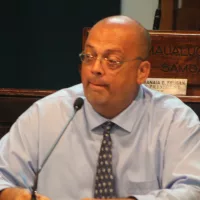
The American Samoa Power Authority has made changes to its garbage collection services.
Previously, the authority contracted local companies to provide the service. But since February 5, all residential garbage collection is now done by ASPA. Collection of garbage for businesses remains with private companies.
As explained by Acting CEO Ryan Tuatoo at a Senate hearing today, ASPA is providing garbage trucks, which it acquired with a grant, the drivers who are employees of ASPA, and private contractors provide the labor to do the actual collection. ASPA pays for the laborers and the fuel costs for the trucks.
Tuatoo said, previously, the contractors provide their own trucks drivers and laborers. By having ASPA provide the garbage truck drivers, this ensures the service is reliable in that they pick up trash from every household. This reduces the complaints, which ASPA used to receive, that contractors were not collecting trash from every household.
Tuatoo said the ASPA trucks are also safe for employees. There were reports of some contractors dumping garbage in the bush instead of proper disposal at the landfill. By bringing the service in house, ASPA has control to prevent this practice.
Tuatoo said garbage collection for the east side is on Monday, Wednesday and Friday and on Tuesday, Thursday, and Saturday for the west side.
Collection of garbage for commercial customers will continue under contractors who have the requisite equipment.
Senator Togiola Tulafono said the arrangement sounded lucrative for the private contractors. He asked what profit margin was ASPA allowing for the contractors, Tuatoo said the profit margin was about 30%.
Several senators urged that ASPA reduce the cost of electricity which is currently at 39 cents per kilowatt hour. Tuatoo said ASPA spends about $4-$5 million a month on fuel. 70% of the cost of electricity is fuel.
Tuatoo discussed alternative energy projects in the pipeline that would help reduce the electricity costs, including a 20 megawatt solar project in Pavaiai and the planned wind farm that should be operational in 3-4 years.
He said ASPA expects the cost of electricity to be reduced by 50% when these projects are completed.
Manu’a Senator Malaepule Saite Moliga asked about the multi-millon dollar solar projects in Manu’a. When the project in Tau was opened, it was producing 100% power.
Tuatoo explained that ASPA is working with TESLA to bring the plant back to full power. At present, it is producing at 85% capacity. The solar project in Ofu is not currently operational.
Senator Malaepule said ASPA should consider sending locals to study how to operate and maintain these alternative energy systems, instead of relying on outside companies.





